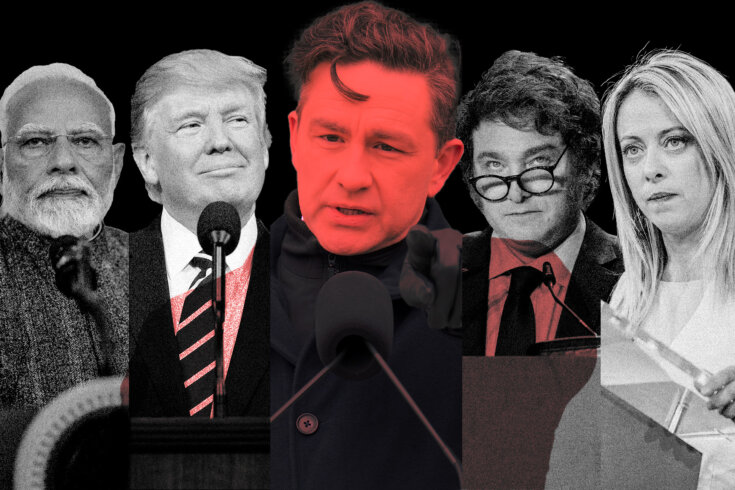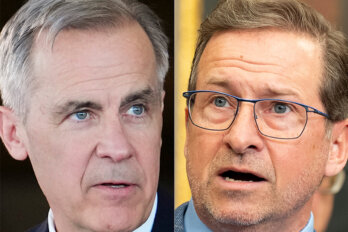The revelation that Indian intelligence operatives allegedly interfered in the 2022 Conservative Party leadership race, which saw Pierre Poilievre emerge as the winner, marks more than a bilateral diplomatic spat. It can’t be dismissed as another headline-grabbing episode in the ugly kerfuffle between India and Canada but rather reveals two major shifts in the global arena: the extension of India’s neighbourhood power-brokering playbook to Western democracies like Canada and the emergence of a coordinated transnational right-wing alliance. As Italian prime minister Giorgia Meloni recently said, “Conservatives are now collaborating globally.”
With Canada preparing for an April 28 federal election already besieged by foreign interference threats, these developments demand greater scrutiny.
Canada’s public inquiry into foreign interference ranks India as the second most active meddler after China. The upcoming election faces heightened risks, with the Canadian Security Intelligence Service alleging that Indian proxies funded diaspora community organizers and amplified pro-Poilievre narratives during his Conservative leadership campaign. While he won decisively, with 68 percent of points and without evidence of direct collusion, the operation mirrors India’s regional strategy: identify potentially sympathetic politicians, mobilize diaspora networks, and promote the religious fundamentalist Hindutva ideology.
New Delhi is exploiting the vulnerabilities of open societies, like Canada, for another reason. A friendlier dispensation, which owes its rule to support from Hindutva ideologues, would be willing to collaborate with the Narendra Modi government to target Sikh separatists and other Indian dissenters who have found a safe space in these countries. Such a move will let Modi’s party highlight the supposed separatist threat posed by Sikhs and minorities in general domestically, allowing it to consolidate the votes of Hindus, who comprise 80 percent of the Indian electorate.
Canada—home to 1.8 million people of Indian descent—is only the latest frontier for India’s meddling tactics. For decades, India has cultivated political influence in its immediate South Asian neighbourhood through a sophisticated blend of economic incentives, cultural diplomacy, and covert operations. These countries, much smaller than India but with a shared pre-colonial past and close ethnic ties, believe that New Delhi has been backing certain political players.
In Bangladesh, India consistently supported Sheikh Hasina’s rise to power in 2008, securing preferential access to ports and energy projects. Even after the authoritarian ruler was ousted in a popular uprising last year, she has found favour in India as she resides in New Delhi and issues political statements while Modi shuns her successor, Nobel laureate Muhammad Yunus.
New Delhi has been more subtle in Bhutan. By weaponizing its economic aid and political support, India is able to successfully manipulate the electoral choices in the tiny Himalayan kingdom. No party which has tried to assert Bhutan’s sovereignty and independence has been able to return to power in Thimphu.
Another small South Asian country, the Maldives has defied India’s overt political interference and elected Mohamed Muizzu, who campaigned on an “India Out” platform. Afraid of China gaining even greater influence in the strategic archipelago, New Delhi has been forced to eat humble pie and concede Muizzu’s demands.
In the run-up to the 2015 presidential election, Sri Lanka expelled the Colombo station chief of India’s spy agency, accusing him of helping the opposition oust then president Mahinda Rajapaksa. New Delhi has been compelled to engage with the historically anti-India, left-leaning Janatha Vimukthi Peramuna that is now in power, jettisoning its preference for the United National Party and the Sri Lanka Freedom Party as partners in the Sinhala country.
Similar has been India’s experience in Nepal, with its political interference evolving from overt influence to more aggressive forms of intervention. India has played a significant role in shaping Nepal’s political landscape, including persuading it to transition to multi-party democracy. After Modi came to power, while initially promising non-interference, India’s approach has become that of a bully. India’s actions, such as demanding specific constitutional changes to make the country a Hindu state and its role in the recent movement for the return of monarchy, can only be seen as unwarranted meddling.
Nepal’s case exemplifies the major shift in India’s policy under Modi. Before he became prime minister in 2014, New Delhi looked at securing its neighbourhood as a strategic imperative, using a mix of its soft power as a liberal democracy and hard power as the dominant regional actor. Under Modi, the strategic imperative has been replaced by the promotion of Hindutva, which targets non-Hindus and seeks to recreate a mythical “Akhand Bharat,” or an unbroken India that includes all these smaller neighbours.
Democracy has been given a complete go by, whether in propping Hasina in Bangladesh or the military junta in Myanmar. As a US diplomat under the Joe Biden administration once told me, India wants to be seen as a hegemon in South Asia, where no other country can have a view about anything.
However, this shift is not purely tactical or limited only to Modi but has global implications. Meloni’s speech at the February 2025 Conservative Political Action Conference in the US—where she grouped Modi with US president Donald Trump and his Argentine counterpart Javier Milei as leaders of a global conservative renaissance—highlights an uncomfortable truth: right-wing populists are collaborating across borders with unprecedented coordination.
This alliance of extreme-right forces operates through multiple channels: institutional networks, with Modi’s Bharatiya Janata Party part of the right-wing International Democracy Union, chaired by former prime minister Stephen Harper; shared tactics, such as the adoption, across multiple countries, of former White House strategist Steve Bannon’s “flood the zone with shit” disinformation strategy; ideological alignment on issues like anti-immigration rhetoric (Poilievre being a notable exception); and mutual reinforcement, such as the British extreme-right ideologue Robert Jenrick citing Poilievre as a “lodestar” for Tories.
India’s alleged meddling in Canada fits this pattern, albeit with nuances. Poilievre’s Conservatives have deepened ties with Hindu nationalist groups advocating Modi’s agenda. These groups parrot Conservative talking points about crime, cost of living, and anti-LGBTQ+ politics. For now, the Conservative Party remains the greatest opportunity for the political advancement of the Hindu right in Canada and, conveniently, the party whose politics most closely matches theirs. Don Patel, the party’s candidate for Etobicoke North for the federal election, was dropped after engaging with a comment on social media that suggested that some Canadians should be deported to India, where Modi should “take care” of them. It’s a sign the Conservatives may be treading carefully, but that a candidate who endorses such views found a place in the party at all is concerning.
Meanwhile, Meloni’s Brothers of Italy and Modi’s BJP both champion civilizational nationalism, framing themselves as defenders of traditional values against liberal globalism. The right-wing alliance’s playbook, as described by sociologist Katrine Fangen, seeks “cultural hegemony” through institutional capture and narrative dominance. Despite certain contradictions, all these leaders share a pragmatic core: a shared opposition to multilateral constraints on national sovereignty, whether from United Nations agencies, climate agreements, or human rights tribunals.
Canada’s predicament exemplifies a global crisis. CSIS warns that foreign interference aims not just to sway elections but to erode trust in democracy itself. As India exports its neighbourhood realpolitik, and right-wing leaders formalize their transnational network, democracies face a critical choice: tolerate short-term interference for geopolitical gains or confront the long-term corrosion of electoral integrity.
With Poilievre declining security briefings and Meloni normalizing illiberal collaboration, the stakes for April 28 extend far beyond Ottawa. The world must recognize that the integrity of one democracy affects all others.
We are witnessing a paradigm shift—where borderless authoritarianism meets nationalist ambition. Unless democracies develop coherent defences, the 2020s may be remembered as the decade when the rules-based order succumbed to networked illiberalism. The coming months will test not just Canada’s democratic institutions but the global community’s commitment to preserving the sanctity of national sovereignty in an interconnected world. The outcome may well determine whether the twenty-first century belongs to networked authoritarians like Trump, Meloni, Milei, and Modi or to a reinvigorated democratic order.
Poilievre’s fate at the hustings will be the first of many tests on the road—and the proverbial canary in the coal mine.




